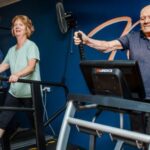Sleep is an integral factor in maintaining good health, and is essential for physical, mental, and emotional well-being. Despite its importance, many people struggle with sleep quality. Understanding the importance of sleep and potential reasons for poor sleep can help us prioritise strategies to improve our sleep quality.
Why Sleep is Important
- Physical Health: Sleep is crucial for the body’s repair and maintenance, as this is when our body rests and goes through the recovery processes to help keep us functioning well. It strengthens the immune system, supports muscle recovery, and helps regulate hormones related to stress, appetite, and growth.
- Mental Health: Adequate sleep is vital for cognitive functions such as memory, learning, problem-solving, and emotional regulation. Poor sleep can lead to increased stress, anxiety, and depression.
- Daytime Performance: Good quality sleep enhances focus, productivity, and reaction times. It also reduces the risk of accidents and errors, contributing to overall safety and efficiency in daily activities. This also means that sleep quality will influence how effectively we are able to complete and respond to exercise.
Why Sleep Quality Can Decline
- Stress and Anxiety: High levels of stress and anxiety can make it difficult to relax and fall asleep. Persistent worry can lead to insomnia or disturbed sleep patterns.
- Poor Sleep Habits: Irregular sleep schedules, excessive use of electronic devices before bed, and consuming stimulants like caffeine or heavy meals late in the evening can interfere with the natural sleep cycle.
- Medical Conditions: Conditions such as insomnia, restless leg syndrome, and particularly sleep apnoea, where breathing repeatedly stops and starts during sleep, can severely disrupt sleep quality. Some medications can also contribute to sleep disturbances and hence you may need to discuss the timing of medications with your GP if you feel this is the case.
The Impact of Exercise on Sleep
- Regulates Sleep Patterns: Regular physical activity helps regulate the body’s internal clock (circadian rhythm), promoting a consistent sleep-wake cycle and making it easier to fall asleep and wake up at the same times each day.
- Improves Sleep Quality: Exercise increases the duration and quality of deep sleep, the most restorative sleep stage. This leads to better physical recovery and mental health.
- Reduces Stress and Anxiety: Exercise can reduce levels of stress hormones like cortisol and increases endorphin production, which promotes relaxation and reduces anxiety, making it easier to achieve restful sleep.
How Exercise Can Help with Sleep Apnoea
- Weight Management: Obesity is a major risk factor for sleep apnoea. Regular exercise helps in maintaining a healthy body composition, which can significantly reduce the severity (partly by reducing the amount of soft tissue that may obstruct airways during sleep) or even eliminate sleep apnoea symptoms.
- Strengthens Respiratory Muscles: Exercise can enhance the tone and strength of the muscles involved in breathing, helping to keep airways open and reducing the frequency of apnoea episodes during sleep.
- Improves Cardiovascular Health: Enhanced cardiovascular fitness from regular exercise improves overall heart and lung function, which can mitigate some of the adverse effects of sleep apnoea.
Practical Tips for Incorporating Exercise into Your Routine
- Consistency is Key: Aim for at least 150 minutes of moderate-intensity or 75 minutes of high-intensity exercise each week.
- Optimal Timing: Exercise at the right time—morning or afternoon workouts are ideal, as vigorous exercise close to bedtime can interfere with falling asleep due to increase in body temperature and production of adrenaline. If you are feeling the affects of stress or anxiety, instead performing a low load/ intensity, flow style of movement that focuses on slowing the breath may help to relax the body and calm the mind to assist in getting to sleep.
- Mix It Up: Combine aerobic exercises (like walking, running, or cycling) with strength training (weights) and flexibility exercises (such as yoga or stretching) for comprehensive health benefits.
- Relaxing Bedtime Routines: Calming activities such as gentle stretching, meditation or deep breathing can help to signal to you body that it is time to wind down, and relax/prepare your body for sleep
By prioritising regular exercise, you can improve your sleep quality, enhance overall health, and effectively manage conditions like sleep apnoea. An Exercise Physiologist can be a helpful resource in determining how to effectively involve exercise into your routine, and what exercises will be most suitable for your goals and needs.










